What are some other ways of saying, “I look forward to hearing from you?” The phrase can sound slightly generic in modern emails. It’s vastly overused. And when writing an important email, where a person wants to inject urgency, how can they do that?
What does “I look forward to hearing from you” mean?
The phrase “I look forward to hearing from you” is a standard phrase used in most official conversations. While it can be used in spoken conversations, it is the most common way to sign off an email. It can be used even in casual conversations. In the business world, it is considered a professional way to conclude a conversation.
When you use this phrase, you are indicating to the other person that the conversation is ending. You are also conveying that you would like to hear from them. Here the phrase “hearing from you” can be interpreted as ‘awaiting a response.’ It is an idiomatic way of saying that you want the other person to speak, so you can hear from them.
The phrase does not mean you are expecting them to respond immediately. They could respond at a later time. If it is an e-mail, you are telling them you are expecting a reply soon. In a conversation, it makes the end and lets the other person know that there is a message you are expecting from them in the near future.
When is “I look forward to hearing from you” used?
The phrase is a polite and professional way of saying, “I am expecting your response/reply to what I said.”
It is used in most business conversations, whether done face-to-face, over email, of through online chat. It has become the standard signing off phrase for conversations. When you end a conversation, you will use the phrase to indicate you are concluding the conversation for now. In the business conversation, you would have placed a proposal or communicated something of importance.
You now want the other person to respond. This phrase can be used to courteously tell the other person that it is now their turn to respond. It is a standard phrase that is commonly used. Sales and marketing persons use this term very frequently. It can also be used by all other professionals. You can even use it in a casual conversation with a friend, such is popularity of this phrase.
20 alternative ways of saying “I look forward to hearing from you”
While “I look forward to hearing from you” is very common in usage, there are alternatives available for this phrase. The next section will tell you the limitations of using this phrase.
To overcome the limitations, you can use any of the alternative phrases mentioned below:
1) I’ll await your immediate response
This phrase is more specific it indicates you are expecting a reply immediately.
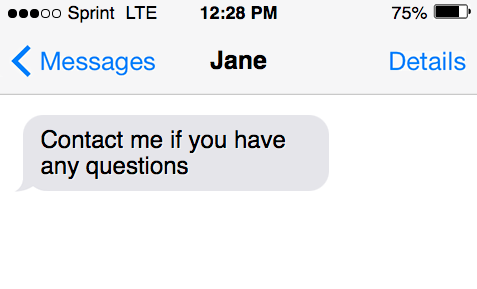
2) I would appreciate a quick reply/response
The word ‘appreciate’ is more pleasant and indicates you are grateful if the other person responds. ‘Quick’ indicates urgency in the communication.
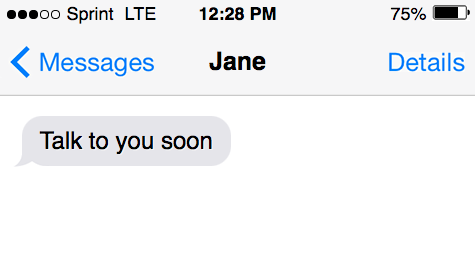
3) Can you let me know your feedback by Monday?
This is very specific since it indicates a deadline and can be used where the urgency is high. This is a good way to close a sales conversation.
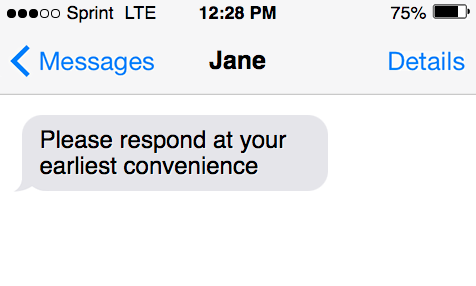
4) Always happy to hear from you
Similar to the original phrase, it is more courteous and informal. It keeps the conversation tone cheery.
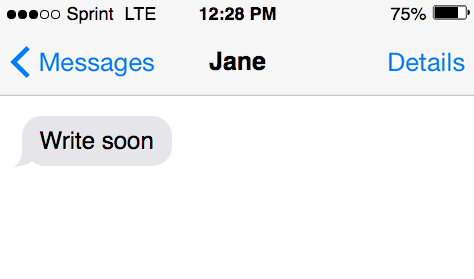
5) Keep me informed/updated
Useful when you want to sign off crisply and shortly.
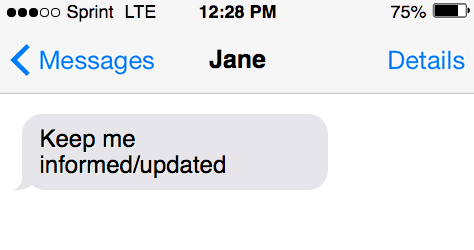
6) Write soon
This is a casual sign off suitable for emails. Not suitable for formal communication.
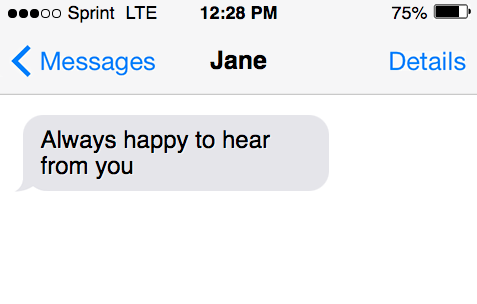
7) Please respond at your earliest convenience
Very formal and lets them know you want a response at the earliest, but at their convenience. You are letting them know it is urgent, but not pressuring them at the same time.
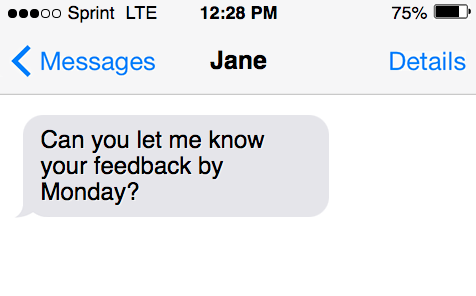
8) Talk to you soon
A very casual sign off. It is more suited for informational communication. It is a good way to end a phone conversation.
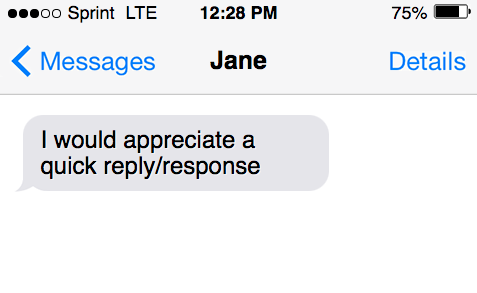
9) Contact me if you have any questions
This is another way of saying, get back to me. But you are using ‘questions’ to indicate that’s what you are expecting from them.
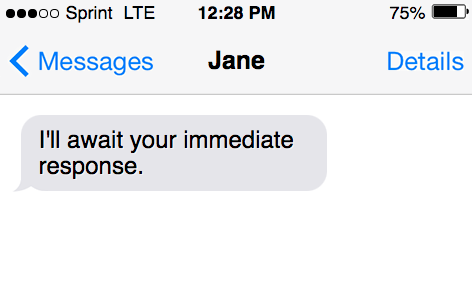
10) Can we meet on Friday to take this further?
Very specific as it suggests a day. It also suggests a follow-up meeting, which will take the deal/project/discussion ahead.
11) If I don’t hear from you by next weekend, can I assume we are moving ahead?
This is very specific and puts the ball in the other person’s court. If they don’t get back, you are telling them it is confirmed you are going ahead (with the sale/project or whatever is the issue).
12) Let me know if something changes
Here you are asking for specific issues related to the topic under discussion.
13) Please be in touch asap
While this is polite and casual, the use of asap (as soon as possible) indicates a bit of urgency. More suited for chat and SMS.
14) I will be awaiting your input to move ahead
This is again specific since you are letting them know they need to give you inputs without which you cannot proceed.
15) Do let me know if I could get in touch with someone else if you are not handling this?
This is useful when you are not sure if the person you are dealing with is the right one/decision maker.
16) Let me know if you are interested so that we can start immediately
Here, you are asking for a confirmation of their interest. This is specific since it asks them if they are interested. It also indicates an urgency to proceed.
17) Any questions?
A good way to end, since you are keeping the conversation open and expecting immediate feedback.
18) Please call me by <date & time>
This is crystal clear and indicates you want them to get back to you.
19) I will be waiting for your email
A useful way to end an email conversation where you indicate that a response is required.
20) I value your immediate reply
Here again, a sense of urgency is introduced while keeping the conversation courteous.
Pros and cons of using “I look forward to hearing from you”
“I look forward to hearing from you” has become a common phrase used in e-mails or in conversations. Let’s look at the pros of cons of using this phrase.
The pros and benefits of using this phrase are:
- It is a very common phrase used frequently. Everyone is aware of this phrase, and it makes sense to use it.
- It is a simple phrase that is easy to understand.
- The person who receives this message clearly understands that you are awaiting a reply.
There are some cons and disadvantages of using this phrase:
- Since it is such a common phrase, there is a tendency to overuse this phrase.
- As it is used too often, people may get irritated when they see this phrase. As a result, they may ignore the message.
- It is a courteous and pleasant sign off. But it does not indicate urgency. It does not specify when the other person should reply. If you want a quick reply, then this phrase won’t help you much.
Sources
- 7 Clever Alternatives to “I Look Forward to Hearing from You”
- I look forward to hear/hearing from you
- 26 Clever Alternatives to Say “I Look Forward to Hearing From You”
- 10 Alternatives to “I Look Forward to Hearing From You”
Inside this article
Fact checked:
Content is rigorously reviewed by a team of qualified and experienced fact checkers. Fact checkers review articles for factual accuracy, relevance, and timeliness. Learn more.
Core lessons
Glossary
- Abstract Noun
- Accusative Case
- Anecdote
- Antonym
- Active Sentence
- Adverb
- Adjective
- Allegory
- Alliteration
- Adjective Clause
- Adjective Phrase
- Ampersand
- Anastrophe
- Adverbial Clause
- Appositive Phrase
- Clause
- Compound Adjective
- Complex Sentence
- Compound Words
- Compound Predicate
- Common Noun
- Comparative Adjective
- Comparative and Superlative
- Compound Noun
- Compound Subject
- Compound Sentence
- Copular Verb
- Collective Noun
- Colloquialism
- Conciseness
- Consonance
- Conditional
- Concrete Noun
- Conjunction
- Conjugation
- Conditional Sentence
- Comma Splice
- Correlative Conjunction
- Coordinating Conjunction
- Coordinate Adjective
- Cumulative Adjective
- Dative Case
- Determiner
- Declarative Sentence
- Declarative Statement
- Direct Object Pronoun
- Direct Object
- Diction
- Diphthong
- Dangling Modifier
- Demonstrative Pronoun
- Demonstrative Adjective
- Direct Characterization
- Definite Article
- Doublespeak
- False Dilemma Fallacy
- Future Perfect Progressive
- Future Simple
- Future Perfect Continuous
- Future Perfect
- First Conditional
- Irregular Adjective
- Irregular Verb
- Imperative Sentence
- Indefinite Article
- Intransitive Verb
- Introductory Phrase
- Indefinite Pronoun
- Indirect Characterization
- Interrogative Sentence
- Intensive Pronoun
- Inanimate Object
- Indefinite Tense
- Infinitive Phrase
- Interjection
- Intensifier
- Infinitive
- Indicative Mood
- Participle
- Parallelism
- Prepositional Phrase
- Past Simple Tense
- Past Continuous Tense
- Past Perfect Tense
- Past Progressive Tense
- Present Simple Tense
- Present Perfect Tense
- Personal Pronoun
- Personification
- Persuasive Writing
- Parallel Structure
- Phrasal Verb
- Predicate Adjective
- Predicate Nominative
- Phonetic Language
- Plural Noun
- Punctuation
- Punctuation Marks
- Preposition
- Preposition of Place
- Parts of Speech
- Possessive Adjective
- Possessive Determiner
- Possessive Case
- Possessive Noun
- Proper Adjective
- Proper Noun
- Present Participle
- Prefix
- Predicate



